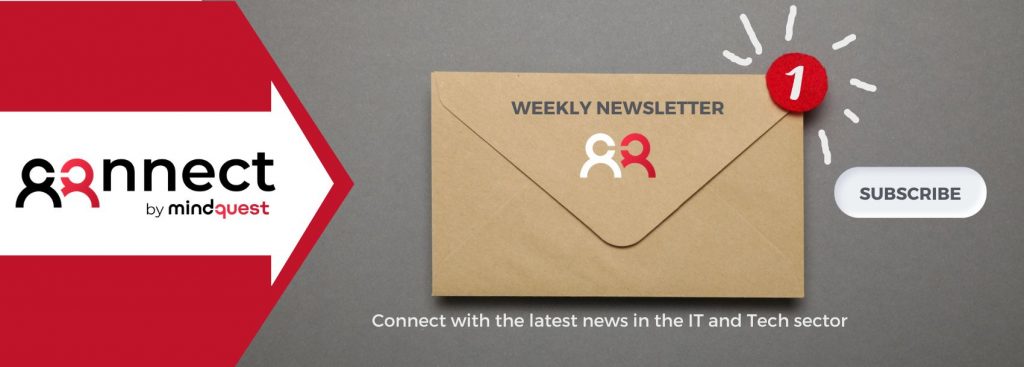Tech education is a force for social transformation. We interview Karen Boers, co-founder & CEO of BeCode, a Belgian coding school bridging social divides through tech education. A social entrepreneur at heart, Karen has kick-started various successful digital transformation projects over the years – including the European Startup Network, the EU’s first network of national startup associations.
How did your professional career begin? How did you enter the tech space?
Well, after some time in HR, I joined what at that point was a brand-new research institution focusing on software innovation. I joined as a management assistant, so absolutely nothing to do with the tech part of the company. But it was a burgeoning institution, and we grew quite rapidly. I evolved into marketing and communications and took on HR as well for a research staff of one thousand people across multiple universities in our country.
We worked closely with industry partners to understand their needs and design software solutions for real-life problems. Not just economic problems, but also societal problems like children that have been ill for a long time and have been isolated from the learning environment. It was the pre-Internet era. So, we started working on solutions for children to have a virtual playground and play and chat with their friends. It was really cool. That’s what got me interested in technology. Not the technology itself, but how it can offer answers to societal problems and bring human-centred solutions into the world.
Then you went on to create several business and career development projects, as well as Europe’s first unified startup network. And at what point did you decide to dive into education and create BeCode?
I saw there was a huge war for talent raging all over the tech world. Not just for startups, but also in bigger companies. During one of our international missions to Kenya, we visited a coding school that was taking people off the streets, providing them housing, and giving them the training to become programmers. They would then introduce them to European startups looking for new talents, offering them as remote employees. And I thought “cool idea, but maybe there are similar solutions to be found closer to home.”
If we cannot find the right talents to join these companies, then we’re going to be in trouble. And not only from an economic point of view. We also have a huge societal problem with lots of people that are being isolated, cornered, and that face a lack of prospects. And, if we don’t address that problem, then we have an even bigger issue coming up.
Being the mother and stepmother of five teenagers, that was kind of in my face. I thought “if I don’t help resolve these issues, my children are going to be in huge trouble five to 10 years from now.” So, for me, the sense of urgency was pretty high. That’s how BeCode emerged from my multiple professional experiences.
I had my love for education, my industry experience, my experience in marketing, and my first steps as an entrepreneur. It all came together into a bigger project where we basically go hunt for untapped talent. We go look for people who are low-educated, in long-term unemployment, of immigrant background, etc. People who, for whatever reason, are struggling in today’s job market today, but definitely not for lack of talent or motivation.
Join our community and find your next job in IT
How do you reach these at-risk people and help them realise and unleash the potential of a career in tech?
We go search for them. We try to inspire them into considering ICT as a career. Often, the problem is not that they’re not talented, but rather that they don’t know that they’re talented. They’re not aware of the potential they have. So, there’s a lot of awareness and evangelisation to be done with these audiences, to get them excited about tech and consider such a career choice.
Then we help them through really hands-on training programs. Not through too much theory, not through listening to the big expert who will tell you what to do, but basically through trial and error. We give you a small exercise, a project, then something more complex, etc. You have a small group of peers and lots of resources that you can draw on. Basically, nobody reads a manual before they start solving a puzzle either, right? They just pick up the pieces. They try bits and pieces. And if it works, it works. And if it doesn’t, you search for another solution. That’s what they do.
What skills are you putting the focus on through your tech education programs?
The funny thing is that our tech education does not actually focus on the tech skills themselves. I mean, it’s a means, but not an end. What we focus on mostly is teaching them how to learn in a technical environment, because whatever competency or programming language teach them today, tomorrow the context and the technologies will have changed. So, they will have learned basically nothing, or at least not how to continue developing themselves as professionals.
That’s why we focus a lot on learning how to learn: understanding where the resources are; how you can apply them to a use case; what to do when you get stuck; how to build a network of peers where you can go and ask for advice; how you look at examples and copy-paste, but not exactly copy-paste, and debug, etc. So, it’s much more about the soft skills and the learning process around technology.

In the end, they come out with a basic set of technical skills, but mostly with the ability to continue learning once they leave this environment. Especially because in seven months you can’t learn everything. So, whatever they come across, they will have to keep learning for probably the rest of their careers.
And that’s what we hear from the companies that hire our graduates. It’s a combination of, “OK. It’s nice to have people with a different perspective around the table, but it’s also nice to see that eagerness to learn and that ability to learn and be a problem solver rather than a bringer of problems.” Also, the ability to resolve problems as a team and work towards goals together.
What’s usually your main piece of advice for those starting out with their tech education?
Always dare to fail. If you don’t try, if you don’t experiment, you’re not going to learn. When you learn how to walk as a kid or even how to ride a bike, which is already a bit more complex, you don’t go sit down and read the manuals first. You fall flat on your face at least a couple of times. But you get back up on your feet. You look at your parents to ask “what exactly did I do wrong?” And maybe they give you a little nudge left or right, and you try again. You do better. And that’s how we learn.
It’s our natural way of learning. We have to accept that, if we want to learn as adults, we also have to fall flat on our face a few times and hurt ourselves a little bit. We’ll look at other people for small tips and pieces of advice, then take those and try again. And that’s OK. It’s not shameful to try something and not succeed at the beginning, or even not to succeed at all. But if we don’t dare to venture out there and try, then we will get nowhere.
What are some of the most incredible stories of personal transformation you have seen at BeCode over the years?
That’s a tough choice. We have seen over 1,500 stories pass in front of our eyes, and many of them are absolute tearjerkers. I think the one that touched me the most was that of a female refugee. She spent two years trying to come to Europe and had asked for asylum. It was a really rough journey where she saw a lot of hardship and people suffering around her. I don’t think she even dares to tell the people that she met here in Belgium.
She then spent another two years here going through the motions of becoming a refugee: doing the paperwork, learning the local language, etc. And then she came across BeCode. She was so eager to learn.
While she was with us, she was also trying to get her children, who she had had to leave behind, over to the country. And she succeeded not only in finishing the programming course and securing herself a job, but also in getting her children here. You could see it in her eyes that she was absolutely convinced that she was going to make this happen. No was not an option. And she persevered. She had a rough time during the training at certain points, but she always saw it through and found a way out, and she was always open to helping other people. When you see people like that graduate, secure a job, see them reunited with their children; those stories, they stick with you for life.
But I love helping the local people as well. It can be equally rewarding to see somebody who’s been a truck driver for twenty, twenty-five years and started struggling with their back and is not able to drive the truck anymore. That was basically their whole life. They spent their whole life in their truck and then, all of a sudden, they’re completely stuck. If you can somehow make them see that there might be an alternative career for them through tech education, an alternative future; that can be a life-changer.
What new tech education projects is the BeCode team working on these days?
We have seen that, for some, becoming a professional programmer is a good career choice. But for some, it’s a bridge too far, and that’s okay. Right now, we are developing a number of shorter training programs, so that they can just taste and try and then decide whether it’s something for them.
But we are also working on programs to teach people basic digital skills, how they can survive in a collaborative workspace so that we all had to become acquainted due to the global pandemic. Things like how to download your work schedule from the Internet as a factory worker, how to apply for your holidays through an app instead of by writing on paper.
If you look at recent studies, the digital divide is mostly on those digital skills. Yes, there’s clearly a shortage of programmers. But the biggest problem is on fairly basic digital skills that really hamper people from being proficient as professionals and in their personal lives. And that’s a disaster.
If you look just at Belgium – and we’re quite a developed country, aren’t we? – 40 per cent of all Belgians lack the digital skills to be proficient in what they do today. And, if you look at low-educated people or people in low-paid jobs, that number rises to seventy-five per cent. So there’s a lot of work still to be done and not just on the programming side. That’s our conclusion and our path forward, to include these people as well and not leave them side-lined.
Check out more of our interviews from our podcast episodes.
Follow Karen on LinkedIn and Twitter.
You can connect with BeCode through their website, LinkedIn, Facebook and YouTube.
